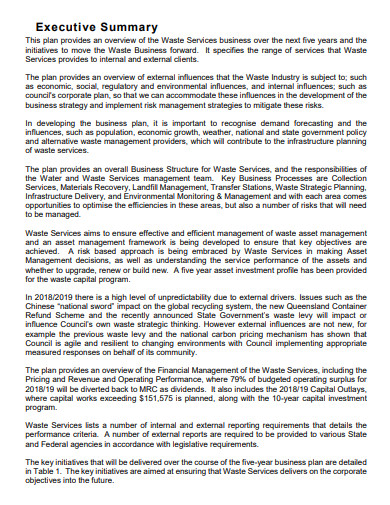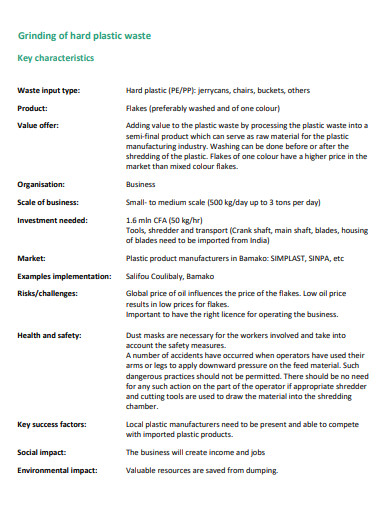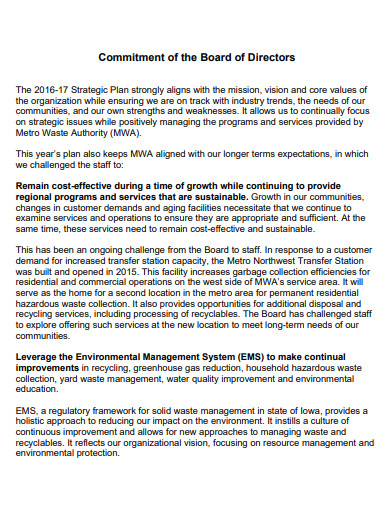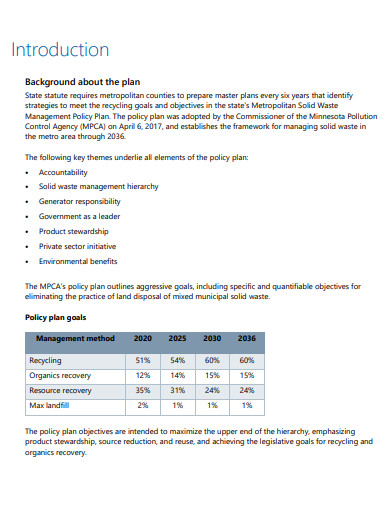In a world with a population of almost 8 billion people, waste is an ever growing problem. Especially for a society that is continuously going through modernization. Every establishment, large and small, produces all kinds of waste, and they need a way to dispose it. Most organizations are not capable of disposing their own wastes themselves, and has to rely on external companies to take care of that. With that, waste management businesses are constantly on demand in every city all around the world. Although competition is not crowded, it is pretty centralized. There’s usually already a huge waste management company taking care of almost the entire state. So if you plan on establishing a waste management company, or to boost your company up the market ladder, then writing a business plan is the best step your can possibly take.
Businesses are pretty complicated entities to manage. Even more difficult when you want your venture to succeed. It can be quite a chore to keep track of all the components in and around the business, making sure that all business operations are covered and taken into account. That is why it can be very rewarding for businesses of all sizes to come up with their own comprehensive layout or a plan, regardless if the business is a startup or not. A layout helps keep every single entity of your business, especially supervisors and managers, on track for the things that may be encountered for the duration of the venture. A well written business plan really helps bring the business altogether, making every business operation as smooth as possible.
Starting a business without a proper business plan is not a really good idea. Since it would easily translate to diving into a business without a proper scope of what you want to achieve. You’re essentially just starting something without an end goal in mind. Sticking to a well written business plan comes with a whole lot of benefits. Like, but not limited to, being able to come up and experiment with new ideas without having to invest too much time and resources on ventures that don’t really work. Acquaint yourself properly with the document by checking out these waste management business plan samples that we have listed for you down below. Once you are familiar with the document, what it looks like and how it works, feel free to use these samples as guides or even as templates for when you write a waste management business plan of your own.
4+ Waste Management Business Plan Samples
1. Waste Management Business Plan
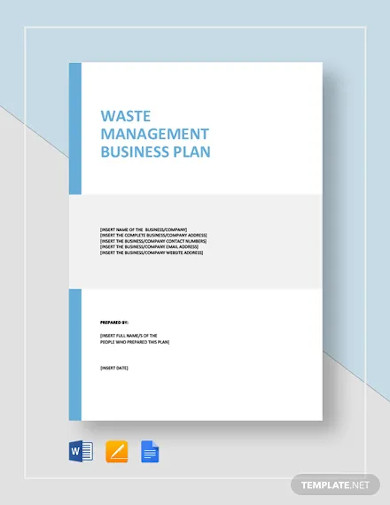
2. Waste Services Business Management Plan
3. Solid Waste Management Business Plan
4. Sample Waste Management Business Plan
5. Waste Management Business Plan Example
What Is a Waste Management Business Plan?
A business plan is simply a document that describes how a business would define their own objectives and enumerate the steps that the management would take in order to achieve the goals that they have set. The document lays out a set of guidelines that the whole company can follow, taking into account the inputs of its different departments, from marketing, financial, to operational. What makes a business plan incredibly beneficial is not just its ability to set these guidelines, but also how it can be used to attract prospective investors and potential business partners even before the company has been fully developed. A good way to secure funding and additional resources early on if you ask me.
Though the document can be a very influential tool for startup businesses and new companies, every company and organization should be able to come up with their own comprehensive business plan. Doing so will give them a document that they can periodically review and update to see how close they are to reaching the goals that they have set and how the circumstances that they have been working with has changed over time. A well written business plan is a document that is able to outline the projected and estimated costs of the project, as well as present its estimated outcomes. A business plan should also be able to assess the potential pitfalls of a decision that the management has or will have made. And despite being so widely used and prominent in the business and corporate space, it’s still pretty rare to see two different business plans from two different companies to be completely identical. Most organizations have their own ways of solving internal and external issues, which makes their business plans completely unique from each other.
Elements of a Recruitment Business Plan
The length of your document greatly depends on the nature and the scope of the business that your business plan will focus on. However, it is a universal standard for business plans to be around 15 – 20 pages long, but as I’ve said, that depends on you and your company. And although no two business plans are completely alike, they still largely operate with almost the same components. These elements are listed and will be discussed in more detail down below.
1. Executive Summary
Your business plan should begin with an executive summary that outlines the company itself and what it stands for. It should present its mission-vision values, the company leadership, employees and employee operations, and the general location of where the business fully operates.
2. Products and services
The document should then present the various products and/or services that they are offering. It has to include the pricing, estimated product lifespan, duration of services, and the various benefits that the customer may gain once they have availed your services. You can include factors like manufacturing and production processes too, as well as patents and the proprietary technology.
3. Market analysis
A business needs to have a perfectly clear idea of their target customers as well as their respective demographics. Market analyses will outline who or what the current competition is, and how well you can take advantage of the market. It will also provide you an insight of the current expected consumer demand, and how difficult it would be to take advantage of that.
4. Marketing strategy
Once you’ve done your market analysis, highlight how you intend to attract the customer base and how you want to keep them engaged with your business. This is highly important because you generally wouldn’t want one-time jobs as a waste management company. You would want a repeat business, so outline a clear distribution channel that includes the marketing and advertising campaigns, as well as through which mediums will these campaigns be distributed.
5. Financial planning
A well laid out financial plan can be very attract for investors who wish to be a part of a venture that has the capacity to return a good investment. Include in this section your financial statements, balance sheets, and other financial information that needs to be present.
6. Budget
Budget is a part of finances, but it generally refers to the current budget of which the company is running on. Include costs, staffing, manufacturing, development, marketing, and other expenses that your company has or will make.
FAQs
What are the 5 R’s of waste management?
Reduce, Reuse, Recycle, Recover, and Residual Management.
What are the five elements of a business plan?
- Situation analysis
- Market
- Product or service positioning
- Setting objectives
- Strategy
What is effective waste management?
For sustainable waste management, waste minimization, reuse, recycle, and energy recovery is most important.
One last important quality of a business plan that you have to remember is that the document is not supposed to be fully static. A business plan is meant to be ‘live’, meaning that it should be updated and changed regularly to adapt to the ever changing aspect of a business. Review your document, then assess how the business is doing. Make changes when necessary. That’s how to get the best out of a business plan.
Related Posts
FREE 3+ Cake Shop Business Plan Samples in PDF MS Word ...
FREE 9+ Operational Plans for Hotel in PDF MS Word
FREE 14+ Business Operational Plan Samples & Templates in PDF ...
FREE 8+ Biotech Business Plan Samples in MS Word Google Docs ...
FREE 15+ 30-60-90 Day Plan Samples in PDF MS Word | Google ...
FREE 11+ Trucking Business Plan Templates in PDF MS Word ...
FREE 10+ Environmental Project Proposal Samples [ Education ...
FREE 10+ Management Research Report Samples [ Waste, Wealth ...
FREE 10+ Construction Business Proposal Samples in PDF MS ...
FREE 10+ Juice Bar Business Plan Templates in PDF MS Word
FREE 9+ Event Operational Plans PDF
FREE 13+ Quality Assurance Plan Templates in PDF MS Word ...
FREE 6+ Business Profile Samples in PDF
FREE 5+ Business Development Strategy Plan Samples in MS Word ...
FREE 10+ Simple Operational Planning Samples & Templates in ...

